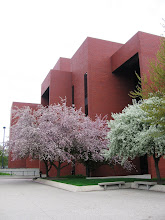Adaptive Computer Technology Specialist Presents Program to Libraries’ Personnel on Understanding Blindness
During his freshman year in 1997, Carlos E. Taylor began working at Ball State University’s Adaptive Computer Technology Lab as an assistant. Since that time, he has completed his master’s degree in Information and Communication Sciences.
On Tuesday, March 13, 2007, Carlos took time from his responsibilities as Adaptive Computer Technology Specialist to address the University Libraries’ personnel who were attending the Libraries’ Staff College program. These sessions, which are generally held during winter and spring breaks, are designed to provide ongoing education and training opportunities for the Libraries’ personnel on a variety of work-related topics.
Carlos revealed that he lost his eyesight when he was a child. He shared with program attendees some facts and dispelled some myths about blindness. About 1 million people are blind in the United States and the number grows about 50,000 annually. Carlos agrees with the National Federation for the Blind’s assessment that the real problem of blindness is not the loss of eyesight; rather, it is the lack of information among the public about blindness.
Carlos addressed some of those misconceptions, such as that people who are blind or have low vision can only work at certain types of jobs or that they have a sixth sense. The definition of legally blind is that the person’s best corrected visual acuity is 20/200 or worse, or the person’s vision field is 20° or less. Some people who are legally blind can see, although they are not able to read signs well. Carlos discussed a few of the useful tools for those with no or low vision, such as money readers, computers that speak words, special readers, Global Positioning Systems, and wristwatches that audibly state the time.
“With the availability of the Internet throughout campus, many newsletters are being published online, and this is great especially for students who are blind because the Internet provides electronic access to publications,” he said.
“With screen readers, refreshable Braille displays, Braille printers, and screen magnification software, students can access a wealth of information through the method that best suits his or her needs.”
These technologies are available at the Adaptive Center in the Robert Bell Building, Rm. 134-G. The lab also offers many hardware and software resources for people who are hearing impaired or for those with learning disabilities or mobility impairment, www.bsu.edu/web/ucs/ucl/act.
Bracken Library provides public workstations that are adjustable height desks with 30”x60” modesty panels that are wheelchair accessible and adaptive workstations with hardware, such as a large trackball mouse, Braille and large print keyboard labels, large key keyboard, and individual headphones. Software includes text magnifiers and screen readers/text synthesizers. Personnel at the Circulation Desk will retrieve materials for persons with visible or invisible disabilities, upon request.
Ball State is proactive when it comes to issues concerning students with disabilities. Carlos mentioned that students' concerns are listened to and acted upon in a timely fashion. The Office of University Compliance at Ball State helps people get equipment they need for research and learning, and they receive some training and assistance to become acclimated to the layout of the campus.
Ball State University offers several services and technologies to assist students who are blind to achieve their goals. For example, the Office of Disabled Student Development can provide a student with note takers for classes, if necessary. The Learning Center can assist by reading exams or provide tutoring sessions. The Adaptive Computer Technology lab assists by making computers accessible by way of a screen reader, which reads text aloud from the computer screen or by providing screen magnification to any on-campus computer.
Campus-wide, signs in Braille are being placed on doors of older buildings to help blind students more easily identify classrooms, offices, restrooms, and other similar spaces. Such signs will be a standard feature for all new campus buildings.
For more information, contact Arthur W. Hafner Ph.D., M.B.A., Ball State University’s Dean of University Libraries, AHafner@bsu.edu, (765) 285-5277.
This newsletter article first appeared in The Library Insider 5(4): 5; April 2007.
Labels: Adaptive Computer Technology, Ball State University Libraries, blindness, newsletter, University Compliance


1 Comments:
Thank you for this report on such an extraordinary spokesperson, and such an important topic.
Post a Comment
<< Home